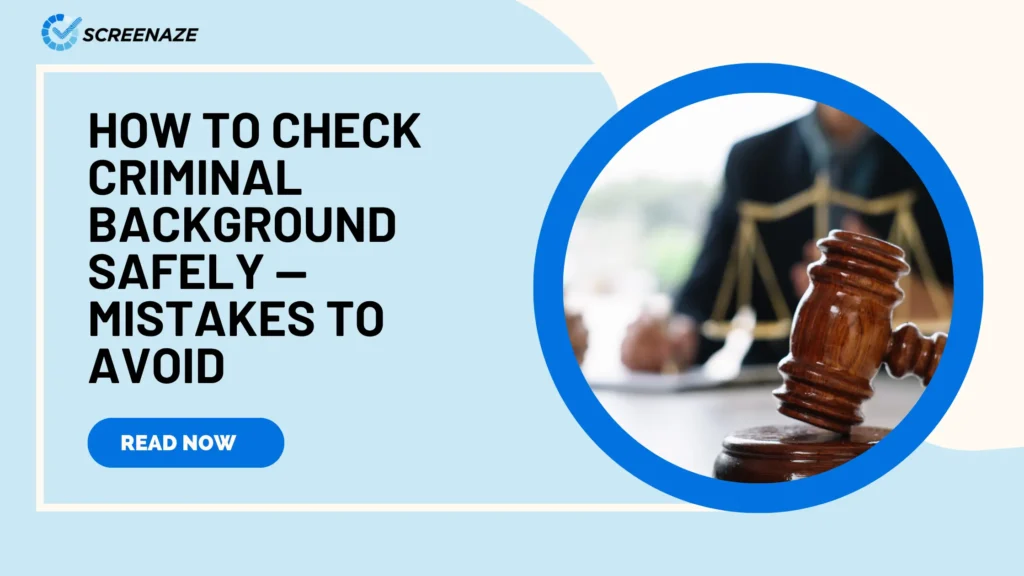In the high-stakes world of recruitment, a candidate’s resume tells you about their skills, but a criminal background check tells you about their character. Conducting a criminal check has become a standard, non-negotiable part of the hiring process for businesses across India. However, the real challenge isn’t just doing the check; it’s doing it safely, legally, and ethically. A misstep in this sensitive process can lead to serious legal consequences, damage your brand’s reputation, and result in discriminatory hiring practices.
Many organizations dive into the process, unaware of the potential pitfalls. From relying on unreliable data to violating privacy laws, the mistakes can be costly. This comprehensive guide is designed to navigate you through the complexities of conducting a safe and effective criminal record check. We will detail a step-by-step approach on how to check criminal records online securely and, more importantly, highlight the critical mistakes you must avoid. Partnering with a trusted expert like Screenaze ensures that your screening process is not just thorough but also fully compliant, protecting your business from unforeseen risks.
Table of Contents
The Legal Framework: The Foundation of a Safe Criminal Check
Before you initiate any criminal history check in India, it is imperative to understand the legal landscape. The process is not a free-for-all investigation; it is governed by laws that protect an individual’s right to privacy. Ignoring these legal tenets is the first and most significant mistake a company can make.
The Cornerstone: Candidate Consent
The single most important legal requirement for any criminal background check in India is obtaining explicit, written consent from the candidate before you begin the screening process. This is non-negotiable.
- What is Valid Consent? Consent must be informed and voluntary. This means you must clearly inform the candidate what the check will entail, what kind of information you will be looking for, and how you will use that information to make a hiring decision. A simple checkbox on an application form is often not enough. A separate, clear, and standalone disclosure and authorization form is the best practice.
- Why it Matters: Proceeding without consent is a direct violation of an individual’s privacy rights and can lead to legal action against your company. It immediately destroys any trust between you and a potential employee.
Data Privacy and Protection
The information gathered during a criminal record check is highly sensitive. Indian laws, including the Information Technology (Reasonable Security Practices and Procedures and Sensitive Personal Data or Information) Rules, 2011, mandate that companies handle such data with utmost care.
- Secure Handling: You must have secure processes for collecting, storing, and eventually disposing of this information.
- Purpose Limitation: The data collected can only be used for the purpose for which consent was given—namely, to evaluate their suitability for employment. Using it for any other purpose is illegal.
At Screenaze, our entire verification process is built on a foundation of legal compliance. We ensure that consent is properly obtained, and with all our servers located within India, we guarantee that your candidate’s sensitive data is handled according to the nation’s stringent data protection laws.
How to Check Criminal Records Online Safely: A Best-Practice Guide
Moving the process online using criminal background check software has made verification faster and more accessible. However, the principles of safety and legality remain the same. Here’s how to do it right.

Step 1: Partner with a Reputable and Compliant Verification Service
This is the safest and most effective way to conduct a criminal check. Professional services like Screenaze have the expertise, technology, and legal knowledge to navigate the complexities of background screening. They have access to legitimate, verified databases and understand the correct procedures to follow.
Step 2: Develop a Clear and Consistent Background Check Policy
Your company must have a written policy for background checks. This policy should be applied consistently to all candidates for similar roles to avoid any accusations of discrimination. The policy should clearly state:
- When a check is required (e.g., post-offer, pre-employment).
- What type of criminal record check will be conducted.
- How the results will be evaluated.
Step 3: Securely Obtain Consent and Information
Use a secure online portal to get consent and collect the necessary information from the candidate. This ensures the data is encrypted and protected from the outset.
Step 4: Leverage Professional Criminal Background Check Software
Your verification partner will use sophisticated software to access a wide range of databases, court records, and law enforcement sources. This technology automates the search, ensures comprehensive coverage, and reduces the chance of human error, leading to a more accurate criminal check.
Step 5: Fairly Adjudicate the Results
Once you receive the report, the evaluation process must be fair and non-discriminatory. It’s crucial to consider the nature of the offense, how long ago it occurred, and its direct relevance to the job responsibilities. An old, minor offense may not be relevant for an office job, for instance.
Top 7 Mistakes to Avoid During a Criminal Background Check
Navigating the verification process can be tricky. Here are the most common and damaging mistakes that companies make.
Mistake #1: Ignoring or Improperly Obtaining Candidate Consent
As we’ve stressed, this is a cardinal sin in background screening. Moving forward without clear, written consent is illegal and unethical. Ensure your consent forms are clear, standalone documents, not buried in the fine print of an application.
Mistake #2: Falling for the “Free Public Criminal Record Check India”
A quick online search will reveal several websites offering a free public criminal record check in India. These services are incredibly risky for several reasons:
- Inaccuracy: The data is often outdated, incomplete, or flat-out wrong. You could be making a critical decision based on faulty information.
- Non-Compliance: These “free” checks almost never comply with legal standards for consent and data privacy. Using them can put your company in legal jeopardy.
- False Positives/Negatives: They can incorrectly flag an innocent person or, even worse, miss a legitimate criminal record.
A professional criminal record check in India is an investment in safety and compliance. The minimal cost far outweighs the immense risks associated with unreliable free services.
Mistake #3: Having an Inconsistent Screening Process
Applying background checks inconsistently is a recipe for a discrimination lawsuit. For example, only running a criminal background check on candidates of a certain demographic, or running more in-depth checks for some candidates than for others applying for the same role, is discriminatory. Create a standard policy and stick to it for all applicants for a specific job level.
Mistake #4: Disregarding Data Privacy and Security
You are the custodian of highly sensitive information. Failing to protect it can result in severe penalties and reputational damage. Don’t leave candidate documents on unsecured computers or share them via unencrypted email. Use a secure platform, like the one provided by Screenaze, where data security is a top priority with secure servers located in India.

Mistake #5: Misinterpreting the Results or Having a “Zero Tolerance” Policy
Not all criminal records are created equal. A “zero tolerance” policy that automatically disqualifies any candidate with any kind of record is often considered discriminatory. The best practice is to conduct an individual assessment. Consider:
- The Nature of the Crime: Is it a minor infraction or a serious felony?
- Relevance to the Job: Does the crime have any bearing on the candidate’s ability to perform the job safely and effectively? (e.g., a financial crime is highly relevant for an accounting position).
- Time Passed: How long ago did the offense occur? Evidence of rehabilitation is an important factor.
Mistake #6: Trying to Do It Yourself (DIY)
While it may seem cost-effective to try and conduct a criminal history check in India yourself, it’s a minefield of complexities. Do you know which court records to check? Do you have access to police databases? Do you understand the nuances of various state and national laws? A DIY approach is inefficient and fraught with legal risks. Relying on experts is not just easier; it’s safer.
Mistake #7: Conducting a Check That is Too Narrow in Scope
Only checking local records for a candidate who has lived in multiple cities or countries is insufficient. A comprehensive criminal check should cover all jurisdictions where the candidate has resided. This is where professional services excel, as they can perform state, national, and even global database checks to provide a complete picture.
Conclusion
Avoiding these mistakes requires diligence, expertise, and the right tools. This is where Screenaze becomes an invaluable partner. We are more than just a vendor; we are your guide to a safe, secure, and compliant background verification process.
- Ironclad Compliance: We put legal compliance at the forefront, ensuring every criminal check is performed ethically and legally, starting with proper consent.
- Advanced Technology: Our powerful criminal background check software provides accurate, comprehensive, and fast results.
- Unmatched Security: With all our servers and operations based in India, we guarantee your data is handled with the highest level of security, in line with national regulations.
- Expert Guidance: Our team helps you interpret reports and set up fair adjudication guidelines, ensuring you make informed and defensible hiring decisions.
Don’t let a simple mistake in the background checking process expose your organization to risk. Build a foundation of trust and safety from the very first step of the hiring journey.
Frequently Asked Questions (FAQs)
-
What is the single biggest and most common mistake to avoid when conducting a criminal background check?
The most critical mistake to avoid is failing to obtain clear, explicit, and written consent from the candidate before initiating any part of the background check. This is the golden rule of compliant and ethical screening.
-
Why is skipping candidate consent such a serious mistake?
Skipping consent is a major legal and ethical breach. It violates an individual’s fundamental right to privacy and can expose your company to significant legal action, fines, and reputational damage. It immediately breaks any trust with a potential employee.
-
Are free online background check websites safe to use for employment screening?
No, using free, public-facing websites for official employment screening is a serious mistake. The information on these sites is often inaccurate, incomplete, or outdated. Furthermore, these searches are not compliant with the legal standards required for making hiring decisions and can lead to unfair or discriminatory outcomes based on faulty data.
-
Is it a mistake to run background checks on only certain “suspicious” applicants for a role?
Yes, this is a major mistake that can lead to discrimination claims. A core principle of safe screening is consistency. You must have a standardized background check policy for each specific job role and apply it uniformly to every candidate who reaches that stage in the hiring process.





